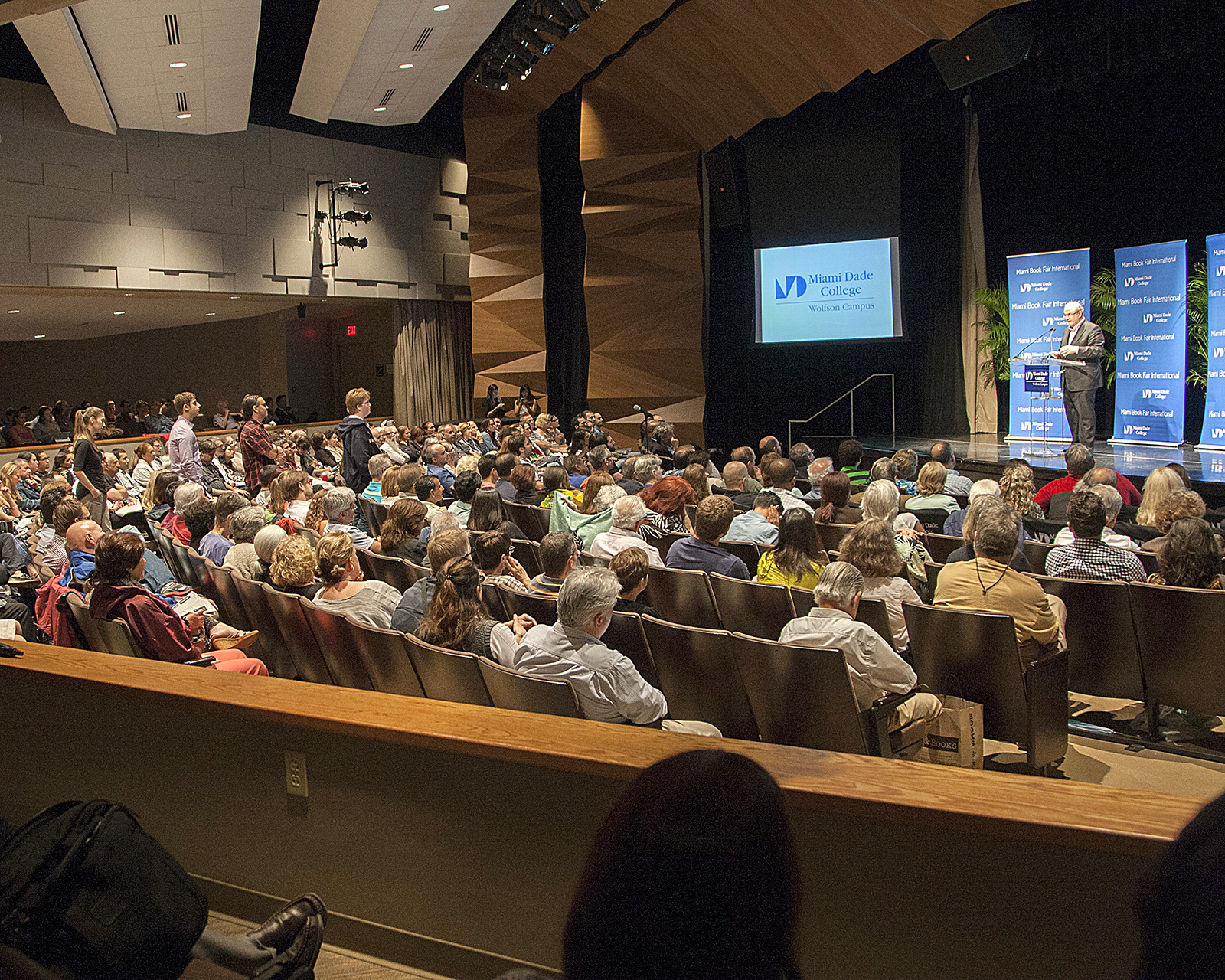
Salman Rushdie brings his magic to Miami
Photo by Sara McCranie/The Center for Writing and Literature at Miami Dade College
It was only fitting that a reading by author Salman Rushdie of his latest book, “Two Years, Eight Months and Twenty-Eight Nights,” a novel whose central character is a genie named Lightning Princess, was preceded by a sudden South Florida tropical storm that included pouring rain, thunder and, of course, lightning. The book in hand, why stop magic realism at the page’s edge?
“Actually, the special effects of the evening are completely appropriate,” deadpanned Rushdie in his opening remarks at the Miami Dade College, Wolfson Campus in downtown Miami. “As you see, there’s a thunderbolt on the cover and there’s a great deal of lightning in this novel.”
The Sept. 18 event opened this year’s “Countdown to Miami Book Fair with Pre-Fair Author Events,” presented by Miami Book Fair and Books & Books. The fair, now in its 32nd year, is part of The Center for Writing and Literature at Miami Dade College, an initiative that promotes the advancement and appreciation of literature throughout the year. Knight Foundation supports several initiatives at the book fair, including The Swamp, a pop-up lounge exploring life in Florida through words, music and more.
Witty, erudite and seemingly totally at ease before a standing-room-only audience, Rushdie not only discussed and read from “Two Years …” but took time, during the question-and-answer period, to zig and zag, like in the novel, between fiction, such as the life of jinns (genies) and life in Fairyland (“in the end, quite boring”) and the realities of the human-inhabited world, including the order to Muslims by Ayatollah Ruhollah Khomeini of Iran in 1989 to kill Rushdie over his book “The Satanic Verses,” and life on the television talk show circuit.
Rushdie, who put the question “What’s the use of stories that aren’t even true?” at the heart of his 1990 novel “Haroun and the Sea of Stories”—it was asked again by a member of the audience—opened his remarks by addressing that very point.
“Good to be back. This time is fiction. Last time I was here it was non-fiction. This is better,” he said. “I arrived in New York 16 years ago with all these fairytales in my luggage so I thought maybe it’s time to unpack, throw this at Manhattan and see what happens. So, genies attack Manhattan. That’s the short of it. That’s the — how do you call it? — high concept,” he deadpanned, before turning serious.
“Fairy tales are always a way of talking about the real world. It’s never just a fable. This is an age of strangeness, an age in which it seems the world is moving very fast, changing very fast, darkening, becoming something we don’t quite understand … and I thought, How do I tell story about that?—and that’s when the jinn walked in.”
As for the value of writing fiction, “one thing to say about fiction stories that aren’t even true is that I resist the idea that it should be useful,” he said. “What is the use of ‘Alice in Wonderland’? It’s the wrong way to look at it. It’s not about utilitarian values. I think it’s a perfectly good defense to say that literature can be useless and that its uselessness is one of its great values.”
As expected, he offered smart, pointed observations about writers and writing. He discussed sex on the page (“I think the only use of sex in literature, really, is as comedy; otherwise you get into various shades of … [sly pause, waiting for the laughter to die down] and we don’t want to go there”) and offered a concise, insightful analysis of Gabriel García Márquez. “[In One Hundred Years of Solitude”] technology, the modern world, is surrealist, where [Remedios the Beauty] ascending to heaven is natural. That’s the kind of inversion that García Márquez uses that creates the magic. … His books come from, essentially, a village sensibility, and my books come from a very urban sensibility.”
And while discussing his own experience, Rushdie offered strong views on writer self-censorship in the face of potential reprisals. “You either write your book or you don’t write your book. If you’re scared to write your book, don’t write your book — and the hell with it.”
“Two Years, Eight Months and Twenty-Eight Nights,” a phrase that hides in plain sight a nod to the classic “One Thousand and One Nights,” includes references to natural and man-made disasters such as Hurricane Sandy and the Wall Street collapse and real-life characters such as President Obama. But it also has a gardener named Geronimo, who one day after the storm discovers he hovers just an inch off the ground. This all plays out in a battle of the worlds, between the good and bad jinns, which lasts two years, eight months and 28 nights.
“It turns into this metaphor of the world we live in, but as you can see the metaphor is quite extended and operates on its own terms as fairy tales should,” explained Rushdie. “But as someone says in the book, to use the language of the fantastic it’s also to talk about the actual, just like to write about the future it’s a way of writing about the present. Any book that’s worth anything is an attempt to say something about the world that we live in. I hope this one says it. It certainly says it oddly, but I hope it says something interesting too.”
The Countdown to Miami Book Fair continues with appearances by authors Cindy Crawford, Oct. 5; Rick Riordan, Oct. 10; Tim Weiner, Oct. 26; Diana Nyad, Nov. 2; and David Mitchell, Nov. 5. Visit thecenteratmdc.org for more information.
Fernando González is a Miami-based arts and culture writer. He can be reached via email at [email protected].
Recent Content
-
Artsarticle ·
-
Artsarticle ·
-
Artsarticle ·
